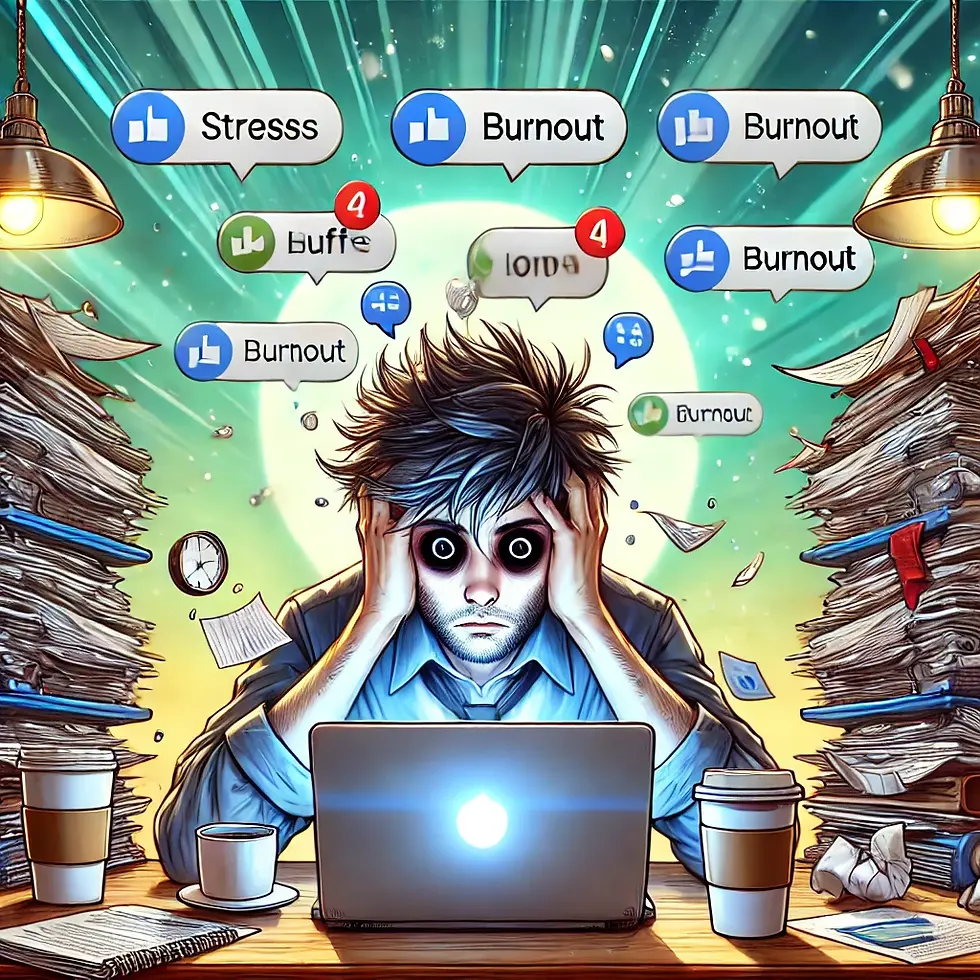Hustle Culture
- Britt Ritchie
- Mar 11
- 4 min read
Updated: 10 hours ago
The Hustle Culture Trap:
Is It Destroying Your Mental Health?

The Allure (and Trap) of Hustle Culture
Hustle culture is like that toxic ex you know is bad for you but still text at 2 a.m. on a lonely night. It thrives on the idea that if you’re not working, grinding, or building your empire 24/7, you’re falling behind. "Rise and grind" has become less of an inspirational mantra and more of a societal demand, pushing people to sacrifice sleep, relationships, and sometimes even sanity for the sake of success.
We see it everywhere—on social media, in corporate culture, and even in casual conversations. If someone asks how you’re doing and you don’t respond with, "Oh, just super busy!" it almost feels like you’re failing at life. But while hustle culture promises success and fulfillment, the reality is often far from glamorous.
The Dark Side: Occupational Burnout
While grinding away at your goals sounds great in theory, reality often brings something less glamorous: occupational burnout. And if you’ve ever reached the point where even answering an email feels like an Olympic-level task, you’ve probably experienced it.
According to the World Health Organization (2019), occupational burnout is a syndrome resulting from chronic workplace stress that hasn’t been successfully managed. It’s characterized by three main components:
Emotional Exhaustion – That deep, soul-crushing fatigue that coffee can’t fix.
Depersonalization – Feeling detached from your job, coworkers, or even life itself.
Reduced Personal Accomplishment – You once had goals. Now, you just stare blankly at your screen, questioning every decision that led you here.
For many, burnout doesn’t just affect work—it seeps into personal lives, relationships, and overall well-being. Studies show that when work becomes all-consuming, sleep deprivation, anxiety, and even depression often follow (Maslach & Leiter, 2016).
Why Are We Addicted to Hustle Culture?
So, if hustle culture is so toxic, why are we still obsessed with it?
1. Social Media’s Role
Social media has turned workaholism into a badge of honor. Seeing influencers wake up at 4 a.m., hit the gym, meditate, build a business, and still have time for a green smoothie can make you feel like a lazy failure. But what we don’t see? The mental toll it takes, the burnout behind the scenes, and the reality that no one’s life is as perfectly curated as their Instagram feed.
2. Corporate America’s Expectations
Many workplaces glorify long hours and "hustle mentality" while ignoring mental health. The expectation to be available 24/7, respond to emails at midnight, and "go above and beyond" has left employees feeling like they’re never doing enough.
3. Toxic Productivity Culture
Somewhere along the way, we stopped valuing rest. Even during time off, there’s pressure to be "productive"—whether it’s learning a new skill, starting a side hustle, or self-improving in some way. The idea of resting without guilt has become a foreign concept.
How Hustle Culture Affects Mental Health
Let’s be clear—hard work isn’t inherently bad. Ambition is great. But when work takes over every aspect of life, it can lead to serious mental health consequences:
Anxiety & Depression – Constant pressure to perform can heighten stress levels, leading to anxiety disorders and depression (American Psychiatric Association, 2020).
Sleep Deprivation – Hustle culture promotes sacrificing sleep for success, but chronic sleep deprivation has been linked to cognitive decline, mood disorders, and even physical health problems.
Loss of Identity – If your entire self-worth is tied to productivity, what happens when you take a break? Many people struggle with feeling "lazy" when they’re not working, leading to a toxic cycle of self-criticism.
Breaking Free: Finding a Healthier Approach to Work
If reading this has made you realize you’re deep in the hustle culture trap, don’t panic. There’s a way out.
1. Redefine Success
Ask yourself—what does success actually mean to you? Is it money? Status? Or is it a life that includes time for rest, hobbies, and relationships? Success doesn’t have to mean burnout.
2. Set Boundaries
Work will take as much of your time as you allow. Set clear boundaries—don’t answer emails after work hours, take your lunch break, and actually use your vacation days.
3. Prioritize Rest
Rest is productive. It fuels creativity, improves problem-solving skills, and prevents burnout. Give yourself permission to rest without guilt.
4. Unplug from Social Media’s Toxic Messaging
Curate your social media feed. Unfollow accounts that make you feel like you’re not doing enough. Follow people who promote balance and well-being.
5. Seek Support
If you’re feeling overwhelmed, therapy can help. There’s no shame in seeking support to navigate stress, anxiety, and burnout.
I’ve Lived the Hustle—And I Can Help You Heal From It
If you’ve been running on caffeine, self-criticism, and calendar alerts for years—and still feel like it’s not enough—you’re not broken. You’re burned out. Hustle culture rewards us for ignoring our bodies, our emotions, and our limits. But it’s not sustainable—and you don’t have to keep paying the price.
I help high-achieving women recover from burnout by identifying the deeper root causes—like ADHD, trauma, anxiety, and perfectionism—and creating space for true healing, not just coping.
Curious about how I can help? Check out these resources:
Or, when you're ready, schedule a consult to chat more.
You weren’t meant to grind your way to worthiness. Healing happens when you stop hustling for permission to rest.
The Bottom Line
Hustle culture glorifies overwork, but at what cost? If success comes at the expense of your mental health, is it really worth it? It’s time to redefine what it means to be successful—one that includes ambition but also prioritizes well-being.
Do you think hustle culture is necessary for success?
Absolutely, no pain no gain
Sometimes, but balance is key
Nope, I’m all about work-life balance
What are your thoughts on hustle culture and its impact on mental health?
Have you experienced burnout?
Let’s talk about it in the comments below!

Comments